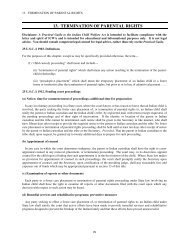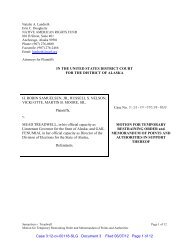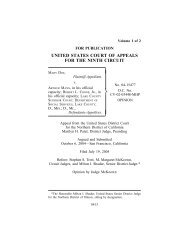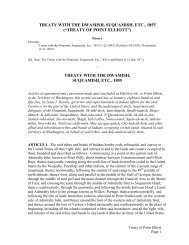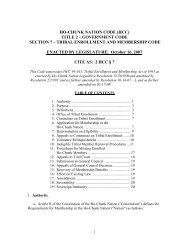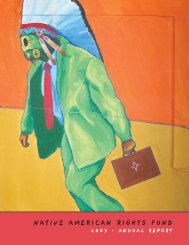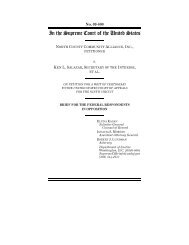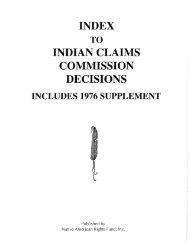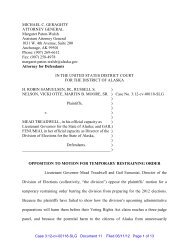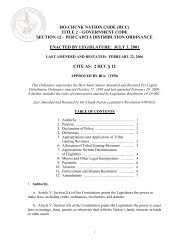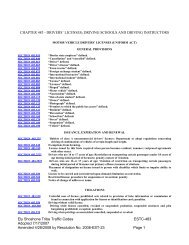Eastern Indian Land Claims Part II - Native American Rights Fund
Eastern Indian Land Claims Part II - Native American Rights Fund
Eastern Indian Land Claims Part II - Native American Rights Fund
Create successful ePaper yourself
Turn your PDF publications into a flip-book with our unique Google optimized e-Paper software.
<strong>Eastern</strong> <strong>Indian</strong> <strong>Land</strong> <strong>Claims</strong><strong>Part</strong> <strong>II</strong>: Updale on NARF's Cases Afler Maine"My people have never consented to Lhe forced sales of theirland, nor has the passing of years dimini5hrd OUr srnsr of in·,justice . .. It was tlw desire of our flT/·dec/·ssors that we holdand TTUlintain the land. It is the desire of the Ma5luzntucketPequot people to continue to exist on its land as a tribe and tobe selj-governin~." - Trihal Chairman Hichanl Hayward ofthe Mashantucket Pequot Tribe of Connecticut, Hearings Ill"fore the U.S. Senate on the Mashantucket Pequot <strong>Indian</strong> <strong>Claims</strong>Settlement Bill, 1982.The end of the Carter Administration may prove to havemarked a significant shift in the progress of settling tIl(' aboriginalland claims of the <strong>Eastern</strong> tribes who, in the early 1970s,began asserting their rights to lands taken illegally from themafter passage and in violation of the <strong>Indian</strong> NonintercourseAct. At the end of his Administration, in October 1980, PresidentCarter signed into law the l\1aine <strong>Indian</strong> Settlemrnt Act,which authorized a $81 ..million ..dollar settlement for the landclaims of three Maine tribes involving two··thirds of the Stall',Settlement of the Maine <strong>Indian</strong> claims, the largest and mostcontroversial of the dozen or so active claims, gave encouragementto other trihrs with claims pending in the courls or innegotiations. But even as the historical settlement was beingsigned, the advent of the Reagan Administration put other tribeson notice that future settlements might he even more protractrdand difficult to rc.ach.CONTENTS WINTEI{ 19112<strong>Eastern</strong> <strong>Indian</strong> <strong>Claims</strong> (Pt. <strong>II</strong>)Planned Giving Program . 3NARF NewsPamunkey ContributionCase Developments .,15G6Another problem in the latter part of 1982 facing these East ..ern trihes with land claims which have not yet heen filed incourt is that a federal statute of limitations law, potentiallyaffecting these land claims, expires at the end of the year. Itis hoped that the statute will be extended, as it has been beforc,but ir it appears that chances for such an ('xtension arc dimming,it is expect(·d that most tribes will file suits to protecttlwir land claims. Fortunat(·ly, most have already done so andtlw courts hav(' put SOrTl(' cases on hold pending settlementefforts,"That no sale of lands made by any <strong>Indian</strong>s, or any nationor tribe of <strong>Indian</strong>s withi'n the United States, shall be valid toany person or persons, or to any state, whether having the rightof pre-emption to such lands or not, unless the same shall bemade and duly executed at some public treaty, held under theauthority of the United States." U.s.. Congress, Trade and Inter..course Act, July 22, 1790.NABF was not only lead counsel in the Maine case - representingthe Passamaquoddy and Penobscot tribes - but earlierrepresented the Narragansett Tribe of Rhode Island when theirland claim was successfully settled hy federal ano state legislationin I97H.. NABF now represents the following tril;t's intheir efforts to have their aboriginal land claims recognized andsettled:Western Pequot Claim: Legislation is pending in Congress tosettle the claim of the Western Pequots of Connecticut. It wouldprovide $900,000 for the Tribe for economic development andgive the Tribe federal recognition status.Tunica·Biloxi Claim.: Now that NARF has successfully assistedthe Trihe in ohtaining federal recognition, a stumblingContinued on page 4
<strong>Native</strong> <strong>American</strong> <strong>Rights</strong> <strong>Fund</strong>The <strong>Native</strong> <strong>American</strong> <strong>Rights</strong> <strong>Fund</strong> is a nonprofil organiziltionspecializing in the prolection of <strong>Indian</strong> rights The priorities ofNARF are: (1) the preservation of tribal existence; (2) Ihe protection of tribal natural resources; (3) the promotion of human righls;(4) the accountability of governments to <strong>Native</strong> <strong>American</strong>s; and (5)the development of <strong>Indian</strong> law.Steering CommitteeExecutive Committee:Leo LaClair (Muckleshoot), ChairmanBernard Kayate (Laguna Pueblo), Vice Chairman ..Curtis Custalow, Sr.. (Mattaponi)Washington.. New Mexico... VirginiaJohn Stevens (Passamaquoddy)......... MaineOther Members:'ReNee Howell (Oglala Sioux) ...Roger Jim (Yakima) ... ""..... "Patrick Lefthand (Kootenai)Chris McNeil, Jr. (Tlingit) .. ".....Wayne Newell (passamaquoddy) .,Leonard Norris, Jr (Klamath)Harvey Paymella (Hopi Tewa)Lois J. Risling (Hoopa) ..Wade Teeple (Chippewa)South DakotaWashingtonMontana.... Alaska... MaineOregon. ArizonaCalifornia.. MichiganNational Support CommitteeOwanah Anderson (Choctaw) • Katrina McCormick BarnesEarl Biss (Crow) • Carole Bourdo (Blackfeet)Gov. Edmund G. Brown Jr • David BrubeckIron Eyes Cody (Cherokee Cree) • Val Cordova (laos Pueblo)Scott Francis. Sy Gomberg. Will H Hays, JrJamake Highwater (Blackfeet-Cherokee) • Alvin M. Josephy, JrDavid Risling, Jr. (Hoopa) • Dr. Jonas SalkWill Sampson, Jr. (Creek) Leslie Marmon Silko (Laguna Pueblo)Maria Tillichief (Osage) Studs Terkel • Ruth ThompsonTenaya Torres (Chiricahua Apache) • Dennis WeaverANNOUNCEMENTS is published by the <strong>Native</strong> <strong>American</strong> <strong>Rights</strong> <strong>Fund</strong> All rightsreserved. Third class postage paid at Boulder. Colorado Oran LaPointe, EditorPlease see enclosed coupon and item on "NARF Publications" in this newsletter lorsubscription informationTAX STATUS The <strong>Native</strong> <strong>American</strong> <strong>Rights</strong> <strong>Fund</strong> is a non profit, charitable organization incorporated in 1971 under the laws of the District of Columbia NARF isexempt from federal income tax under the provisions 01 Section 50](c)(3) of theInternal Revenue Code. and contributions to NARF are tax deductible. The InternalRevenue Service has ruled that NARF is not a "private foundation" as delined inSection 509(a) of the Inlernal Revenue CodeMAIN OFFICE: Executive Director, <strong>Native</strong> <strong>American</strong> <strong>Rights</strong> <strong>Fund</strong>, 1506 Broadway,Boulder, Colorado 80302 (3034478760) D.C. Office: Directing Attorney, <strong>Native</strong><strong>American</strong> <strong>Rights</strong> <strong>Fund</strong>, 1712 N Street, N W Washington. D C. 20036(202785 4166)Founded in 1970 and Incorporated in Washington. DCCor'porate OfficersExecutive Director: John E Echohawk (Pawnee)Deputy Director: Jeanne S. Whiteing (Blackfeet Cahuilla)Development Officer: Mary L HanewallTreasurer: Susan Rosseter HartSecretary: Oran G LaPointe (Rosebud Sioux)Staff AttorneysKurt Blue Dog (Sisseton,Wahpeton Sioux)Richard J. Dauphinais (Turtle Mountain Chippewa)*Walter R EchoHawk (pawnee)Douglas Endreson (Navajo)Kim Jerome GottschalkYvonne T. Knight (ponca-Creek)Arlinda F. Locklear (Lumbee)*Scott McElroy*Don B.. MillerAnita M. RemerowskiTerry L Pechota (Rosebud Sioux)Jeanne S. Whitejng (Blackfeet-Cahuilla)Jeanette Wolfley (Navajo/Shoshone Bannock)Of CounselRichard B. Collins, Bruce R. Green,Thomas N. Tureen, Charles F. WilkinsonLegislative Liaison: Suzan Shown Harjo (Cheyenne·Creek)National <strong>Indian</strong> Law LibraryDiana Lim Garry (Acoma Pueblo) " LibrarianBryce Wildcat (pawneeEuchee) ".. Research AssistantJoyce Gates (Seneca)" SecretaryMary Mousseau (Santee Sioux) .. " Librarian Assistant<strong>Indian</strong> Law Support CenterAnita Remerowski" .. .. . .. DirectorGloria Cuny (Oglala Sioux).. Administrative AssistantHead Bookkeeper: Marian HeymsfieldPlanned Gifts Coordinator: Marilyn Pourier (Oglala Sioux)Office Manager: Rebecca S MartinezSupport StaffHerbert Blacker . . . . , . . . PrinterRose Brave (Oglala Siol/x) .. " . .. Legal SecretaryRosetta Brewer (Cheyenne River Sioux) .... " ReceptionistMary Bumbera* ".. , . "" Legal SecretaryLinda Caso . Legal SecretarySue Feller" " ".. BookkeeperSara Hobson (Navajo) .. " " ". " Legal SecretaryMary Lu Prosser (Cheyenne River Sioux) " SecretaryRena Tardugno* . .. . . . .. . Legal SecretaryPal Tale (Santo Domingo Pueblo) ."File ClerkSteve Wheelock (Delaware) "., NILL AssistantSusan YukYin Tuttle , " BookkeeperLaw Clerks & InternsRobert Anderson (Chippewa)Law ClerkTed Aschenbrenner* " ", Law ClerkColleen DuFour (Standing Rock Sioux)Law ClerkMaggie Fox. . . Legal InternLynn Hayes* .. . . Law ClerkLarry Plank (Yankton Sioux)"..Law ClerkLori Tofsrud (Devils Lake Sioux)""Law Clerk* Washington, D C office staff members2
NARf Initiates Planned Giving ProgramNARF has recently initiated a planned givingprogram which will offer information to donorsvvho would like to consider making a substantia!contribution to the <strong>Native</strong> <strong>American</strong> <strong>Rights</strong> <strong>Fund</strong>,especially through a will. Such gifts represent thefastest growing area of <strong>American</strong> philanthropyand provide a sound basis for future support toorganizations such as ours. They often providesubstantial tax savings to the donor as well astremendous satisfaction by assuring the financialfuture of one's favorite charity. Very importantly,proper planning in setting up such a gift results ina well-managed, long-range financial plan forthe donor.Because of the generous support of CBS, Inc.and the Norman Foundation, NARF recently hasbeen able to add to its staff a Planned GivingCoordinator-an individual specially trained toassist donors with more information on makingwills and major lifetime gifts. We can now providethe individual with the necessary informationfor starting the will-making process. Ourdevelopment staff can also give specific suggestionsfor major gifts that will not affect one'scurrent income. Transfers of insurance, real estate,appreciated stock and other valuables mightall be considered as possibilities for a lifetimecharitable contribution.NARF's new Planned Giving Coordinator,Marilyn Pourier, can help our donors by providingthe initial, basic information necessary tobegin putting one's estate in order. We cannot, ofcourse, provide legal counsel in such matters.Donors interested in making or changing theirwills or giving substantial lifetime gifts will wantto consult their own attorneys.For further information, contact Marilyn Pourierat 303/447-8760 or write her for more informationc/o NARF, 1506 Broadway, Boulder, Colorado80302. All inquiries are strictly confidentialand under absolutely no obligation.The <strong>Native</strong> <strong>American</strong><strong>Rights</strong> <strong>Fund</strong> is fortunateto have MarilynPourier as NARF's firstPlanned Giving Coordinator..Marilyn, amember of the OglalaSioux Tribe of the PineRidge Reservation inSouth Dakota, brings1(;;li;\t~~i@{:~:~v~~~work with NARF, butalso in her for mer capacityas Office Manager of the Coalition of<strong>Indian</strong> Controlled School Boards and as ProjectAssistant to the VISTA Project under the Coalition,Marilyn has previously been a Project Director forthe Johnson-O'Malley <strong>Indian</strong> Education Programon the Pine Ridge Reservation" She has alsoworked for her tribe as Secretary/Assistant to theController, and as Medical Records Technicianwith the <strong>Indian</strong> Hospital in Pine Ridge" In her newcapacity as Planned Giving Coordinator, she willbe filling a much needed position in NARF's funddevelopment program .."President after president has appointed commissionotter commission to inquire Into and reportupon <strong>Indian</strong> aHalrs, and to make siJggestions as tothe best methods of managing them. The reportsare filled with eloquent statements of wrongs doneto the <strong>Indian</strong>s, of perfidies on the part of theGovernment; they counsel, as earnestly as wordscan, a trial of the simple and unperplexing expedientsof telling truth, keeping promises, making fairbargains, dealing justly In all ways and all things.These reports are bound up with the Government'sAnnual Reports, and that Is the end of them. It wouldprobably be no exaggeration to say that not one<strong>American</strong> citizen out of ten thousand ever seesthem or knows that they exist, and yet anyone ofthem, circulated th~oughout the country, read bythe rlght·thlnking, right-feeling men and women ofthis land, would be of itself a campaign documentthat would initiate a revolution which would notsubside until the <strong>Indian</strong>s' wrongs were, so for as Isnow left possible, righted." (Helen Hunt Jackson, ACentury of Dishonor. 1881).3
lock to their land claim, efforts to sptt!p thpir land claim <strong>II</strong>ILouisiana arc now moving alwad ..Schaghticoke <strong>Land</strong> Claim;' After years of negotIatIOns, thedefendants have finally agreed to a proposed settlpment in thisConnecticut claim.. The settlement would provide for 800 acresfor the Tribe, for which the landowners arc seeking $2.2 milliondollars. The Trihe would also ohtain federal recognition andPublic Law 280 jurisdictional status. IA·gislation lIlay <strong>II</strong>{' intro·duced in Congress in late 19R2 or ea r1y 19R:tOneida <strong>Claims</strong>: NARF represents the Wisconsin and ThanH'SBand Oneidas in three cases to Oneida lands in New York Statl'(Other counsel represpnts tlw New York Oneidas) .. A claim for5.5 million acres was dismissed hy a federal district court andis now on appeal. The other two cases involve a claim for250,000 acres lost after passage of the Nonintercourse Act. Atest case for only 1,700 acres of these lands was won and isnow on appeal over the issue of whether the State or thecounties are liable to the Trihe for damages. The case involvingthe rest of the acreage will probahly he filed in late 1982 orearly 1983.Car !1rad Claim.: A sl'ltlement in tlw Cay Head land claimsin Massachusetts is being delayed pending resolution of a claimbrought hy a separate group of tribal memhers .. NARF's motionto dismiss their action is to he hl'ard in December 1982 .. Oncethis issue is resolvl'd, NAHF will prol('ed to gd tIlt' Ii·gislali\(·settlement process back on track in early 198:{ and get thissettlement through Congress.Stockbridge·Munsee Claim.: This is a claim of the Stock·bridge·l\lunsee <strong>Indian</strong>s of Wisconsin to lands in New Yorkwhich they received as a gift from the Oneida <strong>Indian</strong>s H()\\ ..ever, when they were moved to Wisconsin, they wen' Jl('\ercompensated for this land. NARF fill~d a request "ith the De·partment of the Interior asking Interior to assert this claimfor the Tribe. The request is still pending with !rltl'rio!Catawba Claim.:' The details of this South Carolina claim isset out below .. It is now on appeal from the lower fr·dt'ral courtwhich dismissed the Tribe's claim.Although the historical and legal background differs for eachof these trihal claims, they generally haw in common the factthat the land losses are based upon the Nonintercourse Act of1790, which was enacted to prevent transfer of <strong>Indian</strong> landsout of <strong>Indian</strong> ownership without first obtaining federal consent.The present claim of the Catawha <strong>Indian</strong>s of South Carolinais illustrative of the type of dealings under which the <strong>Eastern</strong>tribes lost vast areas of tlll'ir lands i/l violatio/l of til(' NOli"intercourse Act and other laws.Case Study.: The Catawba ClaimIi'! a 1763 treaty with the southern colonies and the King ofEngland, the Catawba <strong>Indian</strong> Tribe of South Carolina gave uppossession of over two million acres in exchange for promisesof a 144,000..acrc tract to be located on the presr'nt bo[(ln ofNorth and South Carolina In 1840, South Carolina, withoutthe consent of the federal government and therefore in viola ..tion of the Nonintercourse Act of 1790, concluded a treaty with4the Catawbas which purportedly extinguished the Catawba claimto their promised reservation In return, the State was tosecure a neW reservation for the Trihe and pay certain sumsof money .. However, the State never fulfilled its terms of tltreaty.The basis of the Tribe's present land claim lies in the factthat the State treaty was concluded in violation of federal law,thereby rendering the attempted extillguishment of the 144,000acres null and void .. The Catawba Tribe has been attemptingto sdlll' its Ia/ld claim sincI' the 1880s. In the early 1900s, itfiler! two litigat iO/l n'fjlll'sls with tIl(' Department of Interior, to/10 avail. Hl'gi/lliing i/l 1976, the Tribe began actively plll'sui/lga legislative settlement to its claims. Intensive negotiations withrepresentatives of Statr~ and local governments and local landOWIH'rs continued for several y!~ars..Finally a special commission, authorized by the State' legis..latu[(~ and appointed by the Governor, proposed a settlementwhich provided for the purchase of a small federal reservationclose to the Trihe's present reservation; restoration of federalhenefits and services for the Trihe and its memhers; estab..lishment of a tribal economic development fund; and distribu·tion of a portion of the settlement fund to individual tribalmemhersUnfortunatl·ly. wlll'n the' State rejected the proposed seule/lll'/lt, till' Tribe Iwd no [('course hut to file suit in 1981 in fed ..eral court for the District of South Carolina seeking to regainpossession of the entire 1763 treaty reservation. The courtgranlr·d tlw Stale's motion to dismiss the Tribe's suit and theease is /lOW Oil appeal..Ancient <strong>Eastern</strong> <strong>Land</strong> <strong>Claims</strong> Settlement BillOn February 9, 1982, a bill was introduced in Congresswhich would, if enactl'd, remove <strong>Indian</strong> suits then in court in·\olving land claims in New York and South Carolina Thr'bill would also authorize the Secretary of the Interior to judgethe credihility of these claims; extinguish 100% of the valueof tIll' la/ld claims and 95% of their monetary value; and itwould allow only certain claims for set monetary damages togo to the US Court of <strong>Claims</strong>.Because the bill would apply to the Stockbridge.Munsee andOneida claims in New York and the Catawba claim in SouthCarolina, and indirectly to the Tunica·Biloxi land claim, NARFhas been involved in the <strong>Indian</strong> opposition to the bill. NARFattorneys drafted a legal memorandum that was filed with bothSenate and House committees considering the bill, laying outthe constitutional objections Hearings were held in June inboth the House and Senate. It is now believed that the bill willnot he reported out of either the Senate or House committeesin this Congress. But there is always the possibility that itssupportns may reinlrodu('(' it in 1983, and, if so, NARF wouldonce again he occupied in opposing its passage.How far these <strong>Eastern</strong> <strong>Indian</strong> land claims will proceed duringthe Reagan Administration is uncertain, but more difficulty issurdy expected since land claim settlements inevitably involvefederal funding - a difficult hurdle considering the currerAdministration's budgl'l policies. Nevertheless, NARF will COlltinue to press the claims of its client tribes regardless of thedifficulties encountered, difficulties which NARF has faced be..fore but overcame in the Narragansett and Maine land claims.
NARF NEWSStaff Attol'ney ChangesIn the Boulder Office, NARF has three new staff attorneys.Scott'McElroy, who joined NARF in April from his positionwith the <strong>Indian</strong> Resources Section of the Department of Justice,transferred to Boulder from NARF's Washington office lastJuly. In August, Jeanette Wolfley and Jerome Kim Gottschalkjoined NARF as new staff attorneys. Jeanette, ofNavajo/Shoshone-Bannock descent, is a recent graduate of theUniversity ofNew Mexico Law School and past president of the<strong>American</strong> <strong>Indian</strong> Law Students' Association Kim was formerlywith the firm of Fettinger and Bloom in Alamagordo, NewMexico, and worked extensively on behalf of the nearby MescaleroApache Tribe.. Rick Collins resigned in August to accepta full-time law professorship at the University of ColoradoLaw School, but he will continue to be associated with NARF onan of-counsel basis. In the Washington office, Lare Aschenbrennerhas departed for a position as Deputy Attorney Generalwith the Navajo Nation, and Rick Dauphinais recentlytransferred to NARF's Washington office on temporary assignment.National Support CommitteeSince the last issue of Announcements was published, California Governor Edmund G. Brown Jr., jazz musician DavidBrubeck, <strong>Indian</strong> author Jamake Highwater, and physicianscientist Dr.. Jonas Salk have joined NARF's National SupportCommittee. The Support Committee was established in 1980md now has a membership of 22 nationally and internationallyknown people in the arts, politics, literature and other areas toassist NARF in its national fund raising and public relationsefforts (see page 2 for a complete listing of NSC members)Following are brief sketches of Mr. Highwater, and also ofpreviously announced members Ruth Thompson and StudsTerkel.The <strong>Native</strong> <strong>American</strong> <strong>Rights</strong> <strong>Fund</strong> is honored to have MrHighwater, Miss Thompson and Mr. Terkel on the NationalSupport Committee.. Their support, along with that of the otherCommittee members, will be of increasing importance inNARF's efforts to continue its legal assistance in <strong>Native</strong> <strong>American</strong>sin the years ahead ..Jamake Highwater was born inMontana of Blackfeet-Cherokeedescent, raised in California, andnow resides in Europe and Africaas well as the United States. Theauthor of numerous award winningliterary pieces, his published worksinclude Journey to the Sky; Anpao: An <strong>American</strong> <strong>Indian</strong> Odyssey(Winner of the 1978 Newbery Honor Award); Many Smokes, ManyMoons:· A Chronology of <strong>Indian</strong>History Through <strong>Indian</strong> Art; TheSuns, He Dies; Song from theEarth: North <strong>American</strong> <strong>Indian</strong> Paintings; and The Sweet GrassLives On: Fifty Contemporary North <strong>American</strong> <strong>Indian</strong> ArtistsOther titles deal with <strong>Indian</strong> dance, folklore, music, history and--Jeanette WolfleyKim Gottschalkfiction. Mr .. Highwater's upcoming books include the GhostHorse Trilogy, consisting of Legend Days, I Wear the MorningStar, and Kill Hole. Besides his writing, Mr. Highwater lecturesnationwide and is active in numerous literary, civic and welfareorganizations throughout the United States He is also featuredin the six part PBS program titled, "Red, White and Black:Ethnic Dance in America," and in another six-part series producedby Bill Moyers for PBS, "Six Great Western Ideas.... He isdeveloping several other PBS programs, one of which is acultural history of <strong>American</strong> <strong>Indian</strong>s titled, "Songs of the Thunderbird,"a six--part series which he is writing, narrating andhosting,NARF is pleased to announce thatStudsTerkel, nationally acclaimedauthor, columnist, lecturer and ra·dio interviewer, has recently joinedour National Support ComitteeMr. Terkel has been heard for over25 years on Chicago's fine arts radiostation, WFMT, where he hostsa nationally-acclaimed, syndicatedprogram, "The Studs TerkelShow" The Peabody-Award programfeatures interviews, discussionsand readings as well as musicaland dramatic presentationsanddocumentaries His best sellingpublications include: Division Street America; Hard Times:· AnOral History of the Great Depression in America; Working;Talking to Myself A Memoir of My Times; and <strong>American</strong>Dreams Lost and Found. Mr Terkel is the recipient of theIllinois Governor's Award for the Arts, the Clarence DarrowCommemorative Award, and has been cited by the Friends ofLiterature for his "unique contribution to the cultural life ofChicago" In the theatre, he has won critical praise in thenational company of Detective Story, as well as for his appearancesin OfMice and Men, The Time of Your Life, A View fromthe Bridge, Light of the Sky and The Cave Dwellers.Continued on page 65
".kew kqNARF is extremely fortunate tohave Miss Ruth Thompson ofConnecticut as a member of ourNational Support Committee Foryears, she has been at the fore·front of issues involving <strong>Native</strong><strong>American</strong>s. Her support, financialand otherwise, of NARF's work onmajor issues such as the Maine <strong>Indian</strong>Settlement Act, hilS milde ilsignificant difference to our <strong>Indian</strong>constituents .. Miss Thompson's interestin <strong>American</strong> <strong>Indian</strong>s begilnwith her work on the Navajo Reservationin a literacy program inthe 1940s.. She also participated as one of the first boardmembers for the fund raising arm of the National Congress of<strong>American</strong> <strong>Indian</strong>s, serving with such early NCAI leaders as RuthBronson, John Rainer, Louis Bruce, Will Rogers, Yeffe Kimballand Bob Burnette Later she worked in San Carlos and for theSave·the-Children on the Papago Reservation in Arizona. RuthThompson's participation with us on behalf of <strong>Native</strong> <strong>American</strong>s throughout the United States is greatly appn'cidledPamunkey Tribe Contributes$10,000 to NARFThe <strong>Native</strong> <strong>American</strong> <strong>Rights</strong> <strong>Fund</strong> would like to publiclyacknowledge and thank the Pamunkey Tribe of Virginia for a$10,000 contribution made to NARF Pamunkey Chief Tecumseh Cook stated: "NARF's work has had a tremendous impact on <strong>Indian</strong> rights all over the country and we hope this willcontinue" The Pamunkey gift, along with recent contributionsfrom the Passamoquoddy and Penobscot tribes of Maine, rep·resents an increasing awareness by tribal governments of theimportance of NARF's role in <strong>Indian</strong> rights and a commitmeniby these tribes to help assure the continuation of NARF's legalassistance for other tribes.CASE DEVELOPMENTSFollowing are summaries of major developments in NARFcases and other matters since the last issue of Announcement~was published.Hecent developmentsin NARF's eastern <strong>Indian</strong>land claims cases are reported on in the lead article on page 1(I) Narragansett Tribe Given Preliminary Approvalfor Federal Recognition. On August 13, 1982,the Bureau of <strong>Indian</strong> Affairs issued a notice that it proposes toacknowledge the Narragansett Tribe of Rhode Island as afederally-recognized tribe .. There is a 120·day public commentperiod, after which the BIA has 60 days to issue its final decisian. Barring some unforeseen problem, the Narragansetts willbecome federally recognized early next year.NARF first assisted the Narragansetts in their landclaim which was successfully concluded when Congresspassed settlement legislation in 1978, the first of the manyeastern <strong>Indian</strong> land claims cases still being negotiated or incourt Federal reCo~lnitionstatus will entitle the Narragansellsto deal with the federal government on government·to··government basis and to receive federal aid assistance,(2) Court Rules Oklahoma Allotments Subjectto Condemnation. On April 28, 1982, the Tenth CircuitCourt of Appeals ruled against several <strong>Indian</strong> allottees inNoble County, Oklahoma, in holding that the City of Stillwatercould condemn easements over their allotments to construct"water pipeline A 1901 federal law authorizes condemnatiofallotments, but a later 1948 statute requires the consent of Itlt::<strong>Indian</strong> allot tees for rights of way across allotted lands, TheTenth Circuit disagreed with NARF's argument that the 1948statute impliedly repealed the earlier 1901 statute, holding thata potential condemnor may either condemn the land under the1901 act or obtain a right of way under the 1948 act A petititonfor rehearing has been filed (Yellowfish, et al. v., City of Stillwater, No .. 81·1948 (lOth Cir, April 28, 1982)).6<strong>Indian</strong> self-government is not a new or radicalpolicy but an ancient fact. It is not somethingfriends of the <strong>Indian</strong>s can confer upon the <strong>Indian</strong>s.Nobody can grant self-government to anybodyelse. We all recall that when Alexander was ruler ofmost of the known civilized world, he once visitedthe philosopher Dlogenes, who was making hishome in an old bathtub. Diogenes was a rich manbecause he did not want anything that he did nothave. !'fe was a mighty man because he couldmaster himself. Alexander admired Diogenes forthese qualities, and standing before him said, 'Oh,Dlogenes, if there Is anything that I can grant you,tell me and Iwill grant it.'Towhich Diogenesreplied,'You are standing In my sunlight. Get out ofthe way.'The Federal Government which is, today, the dominantpower of the civilized world, cannot give selfgovernmentto an <strong>Indian</strong> community. All it canreally dofor self-government is to get out of the way.(Felix Cohen, The <strong>American</strong> <strong>Indian</strong>, 1949).(3) Condemnation ofAllotments Struck Downin Nebraska District Court. On the heels of the TenthCircuit decision upholding condemnation of allotments discussed in the Yellowfish case above, the Nebraska FederalDistrict Court ruled that condemnation was not an appropriatevehicle to obtain rights of way over trust lands in which individuals or tribes have an undivided interest The case challengedrights of way sought by the Nebraska Public Power District toconstruct high voltage transmission lines over lands owned bythe Winnebago Tribe and individual tribal members. It is unclear whether the District Court's decision may be modified inlight of Yellowfish. (Nebraska Public Power District v.. 10095Acres of <strong>Land</strong>, No. 790-411 (DNeb, June 4,1982)).(4) Exclusion of All <strong>Native</strong> <strong>American</strong>s FromJury Panel Held to be In Violation of Equal Protection.NARF recently filed an amicus brief challenging theexclusion of all <strong>Native</strong> <strong>American</strong>s from the jury panelcriminal case in Wisconsin, The court found that the exclu::. ,which was made without examination of all jurors and on theassumption that the <strong>Native</strong> <strong>American</strong>s had prior knowledge ofthe case and the parties, violated the <strong>Indian</strong> defendant's right to
, due process ,The court substantially relied on the arguments inthe NARF amicus brief (State of Wisconsin v, Chosa, No80-1903-CR (S.Ct. Wisc., decided July 2, 1982)),(5) Yankton Sioux Riverbed Case Sent BackQ District em!!"t. In September 1981, the US DistriclCourt for Soujh Dakota had ruled that the Yankton SiouxTribe was the rightful owner of the lakebed of Lake Andeslocated within their original reservation When the case wasappealed by South Dakota, the Eighth Circuit Court of Appealsdeclined to rule on the merits of the case and sent it bilck to theDistrict Court in South Dakota for a ruling on whether the lakewas navigable during certain periods of time. The outcome ofthis case is especially important since it is one of the first courtrulings related to the landmark 1981 decision of the U S Supreme Court in Montana v, United States, which held thatMontana, and not the Crow Tribe, held title to the bed of theBig Horn River within the Crow Reservation (Yankton SiouxTribe v. Nelson (8th Cir.».(6) States Seek Supreme Court Review of <strong>Indian</strong>Water Cases. In two decisions issued in February 1982,the u.,S. Court of Appeals for the Ninth Circuit upheld federalcourt jurisdiction over <strong>Indian</strong> water cases in Arizona andMontana in which NARF represents Montana's Northern CheyenneTribe and the Ft. McDowell Mohave-Apache Tribe inArizona .. The question of whether state or federal courts shouldadjudicate <strong>Indian</strong> water rights is of critical importance to <strong>Indian</strong>tribes. States have historically been hostile to <strong>Indian</strong> rights, andboth Congress and the U.S, Supreme Court have nearly alwaysfavored federal courts as the exclusive forum for deciding <strong>Indian</strong>'perty issues. However, in 1974 the US Supreme Couri held...t state courts, under certain circumstances, also have jurisdiclion to adjudicate <strong>Indian</strong> water rights under a 1952 federal stilluteknown as the McCarran Amendment,in distinguishing the Arizona and Montana cases from theSupreme Court's 1974 decision, which involved Colorado jurisdiction over the water rights of the Ute tribes, the Ninlh CircuitCourt held that state courts may be precluded from exercisingjurisdiction over <strong>Indian</strong> water rights if the state has provisions in itsenabling act or constitution which disclaim jurisdiction over<strong>Indian</strong>s The Ninth Circuit also distinguished the Montana caseson the additional ground that there were no exceptional circumstances favoring state jurisdiction, and in fact the circumstancesin the Montana cases favored retention of federal jurisdictionBoth Montana and Arizona have asked the United StatesSupreme Court to review the decisions. NARF, along withcounsel for other tribes in Arizona and Montana, have filed briefsopposing review The Court will decide whether to review thecases when it convenes in October,(7) Final Decision Issued in Wetumka SchoolCase. The u.,S, Department of Education has issued its decisionaccepting the revised policies and procedures of the WetumkaSchool District in Oklahoma, which will hopefully ensure greaterparticipation by<strong>Indian</strong> studentsand their parents in the Wetumkapublic schools. Under the federal Impact Aid program, the schooldistrict receives federal funding because of its <strong>Indian</strong> studentrr-"llation, However, for years <strong>Indian</strong> parents and the Tribe haveconcerned about the lack of equal participation of <strong>Indian</strong>students in the school program, low achievement levels and thehigh dropout rate. They were equally concerned with the district'spolicies which made it difficult for the <strong>Indian</strong> parents to becomeinvolved with'and consulted about the school programs and theproblems of <strong>Indian</strong> students,Because the school district refused voluntarily to amend itspolicies and procedures to ensure adequate <strong>Indian</strong> oarent andstudent participation in the school programs, as reqtrired by theImpact Aid law, the Tribe filed a complaint to compel compliance.After hearings were held and recommendations filed by anparties, the Department of Education ordered a revision in thedistrict's policies These were accepted on June 10, 1982. TheWetumka experience could aid other <strong>Indian</strong>s in Oklahoma withsimilar problems, and
Thank You For Your HelpOur work on behalf of thousands of America's <strong>Indian</strong>sthroughou~ the country is supported in large part by yourgener.ous contributions" Your participation makes a big differencein olit ability to continue to meet the ever··increasing needs ofimpoverished <strong>Indian</strong> tribes, groups and individuals. The supportneeded to sustain our nationwide program requires your con-- tinued help, Please enclose your contribution wiih the enclosed·coupon or contact Mary Hanewall, Development Officer, at theBoulder office for further information."Giving Can Benefit You"We are now able to better assist you by offering information onmaking a charitable gift through your will (see page (0). Not onlycan such a gift benefit a charitable organization such as ours, butit can,eliminate unnecessary costs and taxes to the donor .. The<strong>Native</strong> <strong>American</strong> <strong>Rights</strong> <strong>Fund</strong> has been in existence since 1970and will continue to exist as long as there is a need for our legaldefense of<strong>Indian</strong> rights. Gifts and bequests in your name will helpus to accomplish our objectives on behalf of <strong>Native</strong> <strong>American</strong>snationwide, not only today but in the years to come .. For furtherinformation please contact Marilyn Pourier at the Boulder officeor check the box on the "Contribution" coupon ..Requests for AssistanceAny work undertaken by the <strong>Native</strong> <strong>American</strong> <strong>Rights</strong> <strong>Fund</strong>,whether it be litigation, advocacy or other legal assistance, mus~come within the priorities and guidelines established by thNARF Steering Committee NARF's resources, both financialand attorney staffing, also determine NARF's ability to acceptlegitimate requests .. All requests for legal assistance or inquiriesregarding NARF's services must be addressed to the DeputyDirector at the Boulder, Colorado office"Jeanne Whiteing, Deputy Director<strong>Native</strong> <strong>American</strong> <strong>Rights</strong> <strong>Fund</strong>1506 BroadwayBoulder, Colorado 80302(303447-8760)<strong>Native</strong> <strong>American</strong> <strong>Rights</strong> <strong>Fund</strong>1506 BroadwayBoulder, Colorado 80302Nonprofit OrgUS POSTAGEPAIDBoulder, ColoradoPennit No 589




